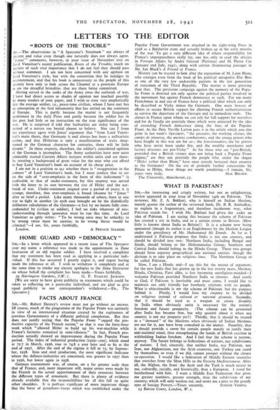FACTS ABOUT FRANCE
SIR,—Mr. Robert Henrey's review must not go without an answer. Of course, much of the programme of the Popular Front was untimely in view of an international situation created by the supineness of previous Governments of a different political complexion. But that does not justify saying that the Popular Front " sapped the pro- ductive capacity of the French nation," or that it was the forty-hour week which " allowed Hitler to build up his war-machine while France's factories remained in semi-idleness." In fact, French pro- duction actually showed an improvement during the Popular Front period.. The index of industrial production (1929too), which stood at 72.7 in March, 1936, rose to 74.8 a year later and to 8o at the end of 1937. After the end of the regime it fell to 75, by Septem- ber, 1938. Iron and steel production, the most significant indicator where the defence-industries are concerned, was greater in 1937 than in 1936, but lower again in 1938.
German rearmament was, of course, on a far greater scale than that of France, and, more important still, major errors were made by the French in the actual apportionment of their resources between the different types of armament. But there is plenty of evidence already available that the responsibilities' for all this fall on quite other shoulders. It is perhaps significant of more important things that the force of parachute-troops which was established under the
Popular Front Government was attacked in the right-wing Press in 1938 as a Bolshevist stunt and actually broken up in the early months of the war. To get a very different idea of where responsibility for France's unpreparedness really lay, one has only to read the articles in Foreign Affairs by Andre Geraud (Pertinax) and M. Pierre Cot (January and July, 1941), along with certain illuminating passages in Mr. Ian Black's A Friend of France.
History can be trusted to look after the reputation of M. Leon Blum, who emerges even from the book of his political antagonist Elie Bois as one of the very few undeniable patriots in the last generation of statesmen of the Third Republic. The matter is more pressing than that. The persistent campaign against the memory of the Popu- lar Front is directed not only against the political parties involved in the movement but against French democracy as such. Far too many Frenchmen in and out of France have a political ideal which can only be described as Vichy minus the Germans. One must beware of efforts to secure British support for allowing French authoritarianism to survive the departure of the Gestapo and its immediate tools. The classes in France upon whom we can rely for full support for ourselves and for de Gaulle are precisely those which were attracted by the idea of extending French democracy along the line.; of the Popular Front. As the Hon. Neville Lytton puts it in the article which you also print in last week's Spectator, " the peasants, the working classes, the camps de jeunesse, the anciens combattants, and the young priests who have fought in this war are for us ; the fonctionnaires, the fat priests who have never been under fire, and the wealthy merchants and factory directors are pro-Vichy." Ai for those who are " pro-British, provided that a British victory does not bring back a Popular Front regime," are they not precisely the people who, under the slogan " Hitler rather than Blum," have once already betrayed their country to the Germans? On the eve of probable further concessions by Petain to Hitler, these things are worth pondering.—I remain, Sir,
yours very truly, MAX BELOFF. The University, Manchester, 13.


























 Previous page
Previous page